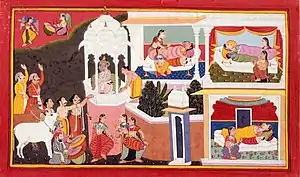Sumitra
Sumitra (Sanskrit: सुमित्रा, IAST: Sumitrā) is a princess of Kashi in Hindu mythology.[1] The wise Sumitra is the third queen consort of Dasharatha, the king of Kosala, who ruled from Ayodhya.[1][2] She is the mother of the twins Lakshmana and Shatrughna as mentioned in the Hindu epic, the Ramayana.
| Sumitra | |
|---|---|
 Sumitra gives birth to her twins. (Top floor to the left) | |
| Texts | Ramayana |
| Personal information | |
| Consort | Dasharatha |
| Children | Lakshmana and Shatrughna |
| Dynasty |
|
Etymology
The name Sumitra is of Sanskrit origin, and could be divided into Su meaning good, and Mitra, meaning friend. Thus, her name means 'a good friend' or 'one with a friendly nature'. She is known in other languages as Tamil: சுமித்திரை ⓘ, Burmese: Thumitra, Malay: Samutra, Khmer and Thai: สมุทรเทวี Samutthra Thewi).
Legend
At the sacrifice conducted by Rishyasringa to obtain sons for the childless Dasharatha, a divine being emerged from the flames with a golden vessel filled with divine payasam. Dasharatha offered half to Kausalya, a quarter (literally half of that which remained) to Sumitra, an eighth to Kaikeyi (again, half of that which remained), and then, on reflection, presented the final eighth to Sumitra.[3] Having received two portions, Sumitra became the mother of twin sons.
Considered the wisest of Dasharatha's three wives, she supported Lakshmana's decision to accompany Rama,[1][4] to serve him during his exile, and comforted Kausalya after the departure of her son.[5]

Neither the principal queen nor the favoured wife, Sumitra was single-minded in her devotion to her husband and to the senior queen consort, Kausalya. She was also known for encouraging her son Lakshmana to go into exile with Rama. She is described to have found a lot of happiness around her son Lakshmana, with the latter being described as the 'enhancer of her joy'.[6] While Valmiki is silent on her parentage, later texts variously described her as a princess of Kashi or of Magadha, and belonging to the Haiheya clan.
Literature
After the exile of Rama, Sita, and Lakshmana, the benevolent Sumitra consoles Queen Kausalya with her persuasive words:[7]
“What should be difficult for him, who, armed with bow and sword, is preceded on his way by Lakshmana? O Lady, abandon grief and infatuation, assuredly you will behold Shri Rama returning from his exile. O You who art irreproachable, O Kalyani, O Auspicious One, you will behold your son like the rising moon, placing his head at your feet. You will shed tears of joy, seeing your son installed on the throne and in possession of the king’s treasury. O Lady, neither grieve nor let your mind be troubled, I see nought that is inauspicious in respect of Rama. Soon you shalt behold your son with Sita and Lakshmana. O Sinless Queen, it becomes you to encourage others, therefore, why dost you now cause your heart distress? O Devi, do not grieve, there is none in the world more virtuous than Rama. Seeing Rama returning from the forest with his friends, making obeisance to you, then will you shed tears of joy, like the clouds in the rainy season. In brief, I tell you, your son Shri Rama, returning to the capital, will press your feet to him with his tender hands. Seeing your son bowing to your feet you will cover him with tears as the clouds cover the mountains with rain.”
During Rama's consecration, Sumitra offers her blessings to the prince:[8]
Hearing these words of (i.e. uttered by) him, O sinless one, she, with her face hung down, slowly said: “Rāma, go to your (own) house.” And Rāma, the best among men, having heard (these) words of his mother, saluted her, and the treasure of compassion went to the house of Sumitrā. The large-hearted Sumitrā, seeing Rāma with her son (Lakṣmaṇa), said, with (i.e. giving him) blessings: Live long, live long.
— Padma Purana, Patala Kanda, Chapter 4
References
- Damani, Gaurang (2021). Essence of the Fifth Veda. Delhi: Motilal Banarsidass Publishing House. pp. 2, 9. ISBN 978-9391430139.
- Dasharatha's third Queen, Charanamrit.com, 19 June 2012
- "The Ramayana in Sanskrit: Book 1: Chapter 15".
- "The Ramayana in Sanskrit: Book 2: Chapter 35".
- "The Ramayana in Sanskrit: Book 2: Chapter 39".
- www.wisdomlib.org (10 November 2019). "Ramayana: Chapter I". www.wisdomlib.org. Retrieved 1 August 2022.
- www.wisdomlib.org (21 September 2020). "Queen Kaushalya finds peace in the consolation of Queen Sumitra [Chapter 44]". www.wisdomlib.org. Retrieved 1 August 2022.
- www.wisdomlib.org (21 September 2019). "Rāma's Consecration [Chapter 4]". www.wisdomlib.org. Retrieved 1 August 2022.
.jpg.webp)